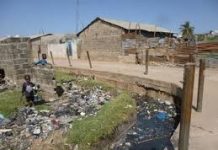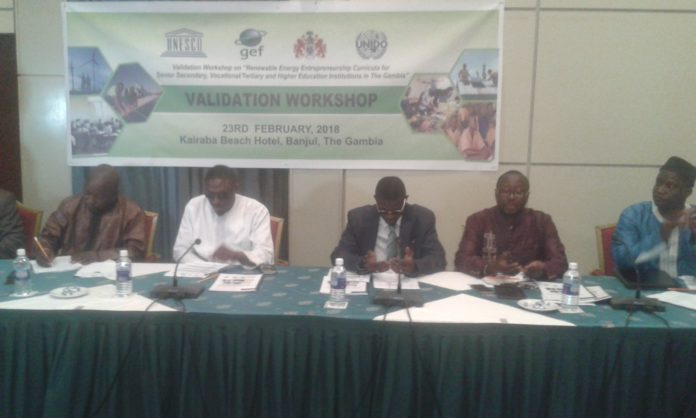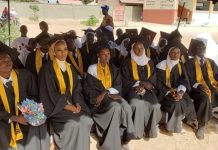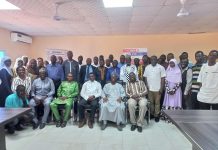By Yankuba Jallow
The Ministry of Petroleum and Energy in consultation with partners on Friday validated the Renewable Energy Entrepreneurship Curricula for Senior Secondary Schools, Vocational/Tertiary and Higher Education Institutions in The Gambia.
The curricula focus on the development of training for vocational/tertiary, Senior Secondary Schools and Higher Education Institutions in the country according to common accepted criteria and standards, focused on the knowledge, understanding and skills for small scale renewable energy sources (Solar PV, Solar Thermal, Wind Power and Biomass), in order to develop the necessary competencies and promote entrepreneurship.
The expected outcome of the curricula includes nationally recognised training courses for Solar PV, Thermal and Wind designers and installers in the Gambia; practical training materials/tools for designers, installers and their trainers; two pilot courses implemented, a pool of skilled PV, Thermal and Wind designers and installers.
According to the specialists the Curricular will contribute to the renewable energy market growth in the Gambia, provide a supporting instrument for the SE4ALL Action to achieve the national target share of energy from renewable energy in the overall national energy consumption by 2020 and 2030.
The Renewable Energy Entrepreneurship Curricula is co-funded by the UNIDO/GEF-5 and UNESCO-NATCOM program in the Gambia.
For the Vocational/Tertiary and Higher Education Institutions in the Gambia, for the Solar PV course, they are expected to learn Basics, Design Principles, Installation, Case Studies-Best Practices, Example Installation of a Small Scale PV and Maintenance and Troubleshooting Quality Management and Customer Care. For the Solar Thermal Course, it covers Overview, Basics, Collectors, Heat Storage, System Design, Low Temperature Applications, Installation and Maintenance and other Applications. On the Wind Power it covers Introduction to Wind Energy, Wind Resources I, Wind Resources II, Test and Measurements, Economy, Net Present Value (NPV), Wind Turbine Technology, Aerodynamics, Materials, Structural Mechanics and Electrical System. For the Entrepreneurship course, it covers Basic Concepts, Historical Perspective, Business Enterprise/Project, Record Keeping, Cash Flow, Employment Issues, Gambia Legal System, Contract and Tort and Agency and Partnership. On the Course Biomass/Bio-Energy it covers Introduction to Biomass/Bio-Energy, Biomass Chemistry, Biomass Pre-Processing and Pre-Treatment, Biomass Conversation to Liquid Fuels, Fluidisation Engineering, Biomass and Biofuel Utilisation and the Bio-refinery concept.
For the Senior Secondary School, the Renewable Energy Entrepreneurship Course aims to develop an interest, motivation and sense of achievement in the study of the Course, develop the ability to describe and explain concepts, principles, systems, processes and applications related to renewable energy technologies and entrepreneurship. Also it also aims at developing the thinking process, imagination, ability to solve problems, data management, investigative and communication skills and develop the ability to translate scientific concepts into working physical models among others. According to the specialists who designed the Course, they said the curriculum is consistent with the sector and relevant educational and professional standards which ensure that graduates from secondary schools will acquire the relevant knowledge, skills and attitude. For the senior schools, the students will be exposed to various topics including energy science, fossil fuel and climate change, exploring home energy use and conservation, building energy efficiency, solar energy, wind energy, hydrogen and fuel cells, sustainable transportation, biomass energy and bio-fuels, geothermal energy, hydro power and environment.
The Permanent Secretary, Ministry of Petroleum and Energy, Mr. Lamin Camara said energy is always prioritize by countries in their development plans because of the important role it plays in socio-economic development. He said renewable energy has potential for clean energy production; it is environmental friendly, sustainable and helps in mitigating climate change. He added that it is a good source of energy for countries that are not blessed with hydrocarbon resources especially the Gambia.
“The main objective of the project is to introduce renewable energy in the school curricula, so as to enable the future generation that is the young to embrace renewable energy. This will enable greater understanding of the subject by the people and thus help the Government’s efforts to promote renewable energy for national development” he said.
Other speakers included Moses Campbell the National Project Manager UNIDO/GEF-5, Secretary General of UNESCO NATCOM, GEF Focal Point in the Gambia, Director General NAQAA and others.






















